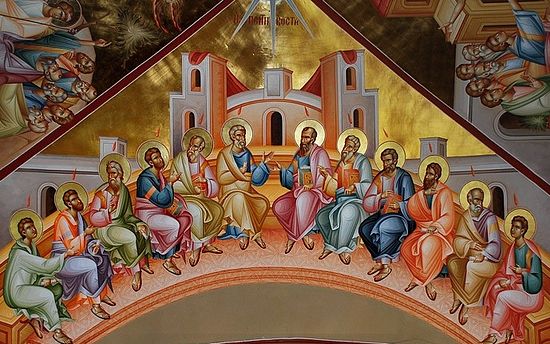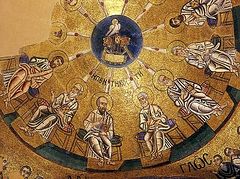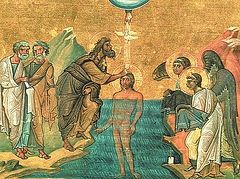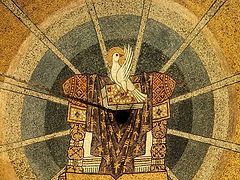In the name of the Father, and of the Son, and of the Holy Spirit!
On Holy Trinity Sunday (Pentecost) we remember the descent of the Holy Spirit upon the apostles on the day of Pentecost, and we call this day the birthday of the Church.
Forty days after the Resurrection, Christ commanded His apostles: Depart not from Jerusalem, but wait for the promise of the Father… For John truly baptized with water; but ye shall be baptized with the Holy Spirit not many days hence (Acts 1:4-5). This happened ten days after the Lord’s Ascension, during the Jewish Feast of Weeks, when they would bring two wheat loaves from the new harvest to the temple. The descent of the Holy Spirit upon the apostles occurred on the fiftieth day after Pascha, and therefore the feast subsequently became known as Pentecost. But if the Jews still to this day mark this day as the giving of the Law on Mt. Sinai during the Exodus from Egypt, then for Christians this day is the feast of the New Covenant, as it was through the descent of the Holy Spirit upon the apostles that the covenant, concluded “in the Blood of Jesus Christ,” revealed its power.
That which the prophet Joel foretold in ancient times: I will pour out My Spirit upon all flesh; and your sons and your daughters shall prophesy (Joel 2:28), was fulfilled on the apostles. From a bunch of frightened disciples, united only by common memories of their Teacher, they turned into the pillars of the Church, proclaiming the Kingdom of God and teaching about the Lord Jesus Christ with all boldness and without hindrance (Act 28:31). These simple and uneducated men of Galilee suddenly left their fears behind and began to preach “of all that occurred from the beginning” with Jesus Christ and “of the great works of God” with the skill and wise insight of experienced orators.
On the day of Pentecost, the entire Holy Trinity revealed itself. Pentecost was the turning point in the apostolic community, as the Holy Spirit gave the apostles fire and water in the form of active and contemplative boldness to preach. When all the disciples were gathered together in one accord, suddenly a sound like that of a violent rushing wind came from heaven… And there appeared unto them cloven tongues like as of fire… (Acts 2:2-3). The prophet Elias heard the noise and felt the gust of wind on Mt. Horeb when the Lord revealed His presence to Him (cf. 3 Kg. 19:11). The pillar of fire led the Jews’ of Moses’ time through the desert. The prophetess Anna said that out of heaven shall [the Lord] thunder upon them … and He shall give strength unto His king, and exalt the horn of His anointed (1 Kg. 2:10). A distinct voice sounded from Heaven several times during the life of Jesus Christ: when He was baptized in the Jordan, when He was transfigured on Mt. Tabor, and when He spoke with some Greeks in Jerusalem. This voice of the Heavenly Father could be like thunder (cf. Jn. 12:28-29). Therefore, the presence of God the Father can be seen in how the descent of the Holy Spirit is described. According to St. Gregory Palamas, the apostles, adopted by God the Father, truly became “Sons of Thunder” (Mk. 3:17) by the force of this sound.
This adoption by the Father and filling by the Holy Spirit could be accomplished only through Jesus Christ, only after His glorification (cf. Jn. 7:39). Jesus Christ constantly intimated to His disciples that He is the reason for the coming of the Spirit, the Comforter. Going to His saving Passion, the Lord told His disciples: And I will pray the Father, and He shall give you another Comforter, that He may abide with you forever; Even the Spirit of truth (Jn. 14:16-17). And again: But the Comforter, which is the Holy Spirit, Whom the Father will send in My name, He shall teach you all things (Jn. 14:26). And also: But when the Comforter is come, Whom I will send unto you from the Father, even the Spirit of truth, which proceedeth from the Father, He shall testify of Me (Jn. 15:26).
Although the Holy Spirit appeared in the world in His fullness after the Son, He, according to St. Gregory the Theologian, was always of equal honor to the Son and the Father. The Spirit Himself “testifies,” “reminds,” and “teaches” the disciples of Christ. Moreover, we see from the sermon in the synagogue in Nazareth that it is precisely the Spirit of the Lord Who anoints Jesus Christ for His ministry (Lk. 4:18).
Therefore, on Pentecost, as at the Baptism of the Lord in the Jordan, the entire Holy Trinity was revealed. There was the voice of the Father from Heaven, as thunder; there was the appearance of the Spirit in the form of fiery tongues, as before in the form of a dove; and there was the appearance of the Son as the Word of God, which became the basis for the preaching of the Resurrection.
On one hand, the activity of the Holy Spirit is like fire. The Son of God spoke of this spiritual fire when He indicated that He came to bring fire to the earth. He even stressed: And how I wish it were already kindled! (Lk. 12:49). St. John the Forerunner specified that the Son of God would be baptized with the Holy Spirit and with fire (Lk.3:16). Sent from the Father through the Son, the Holy Spirit enlightened the apostles and ignited them for the preaching of the Gospel. And as candles are lit one from another, maintaining the same light, so, according to St. Gregory Palamas, through the apostles’ ordination of their successors, the grace of the Divine Spirit is passed from generation to generation in the Church of Christ.
But, on the other hand, the activity of the Holy Spirit is like water. The Gospel of John speaks to this with the words: If any man thirst, let him come unto Me, and drink… But this spake He of the Spirit, which they that believe on Him should receive (Jn. 7:37, 39). Those who have received the Holy Spirit have themselves become fountains of living water, which comes from their bellies; that is, from the heart—as the center of both physical and spiritual life. The apostle Paul wrote about the heart as the center for receiving the Holy Spirit: God hath sent forth the Spirit of His Son into your hearts (Gal. 4:6).
But this reception of grace “in the heart” is not something automatic for man, independent from the life of the entire Church community. The apostle Luke emphasizes the idea that at the moment of Pentecost, the disciples of Christ were together. Therefore, it was those who were with one accord in prayer and supplication (Acts 1:14) and in the apostles' doctrine and fellowship, and in breaking of bread, and in prayers (Acts 2:42) who received the Spirit. To fill the hole in the community, they even chose the apostle Matthias in place of the fallen Judas (Acts 1:26). The first disciples of Christ perceived themselves first and foremost as the people of God, the congregation called to unity in the image of the Holy Trinity (That they all may be one; as Thou, Father, art in Me, and I in Thee, that they also may be one in Us [Jn. 17:21].). Therefore, we must understand ourselves as one Church, not as a group of individuals seeking only our own personal sanctification from God.
The most important Sacrament of the Church, the Eucharist, points towards the Church community’s dimension as a “common work.” The Eucharist is a repast, a partaking of Food and Drink. However, as the modern Greek theologian Christos Yannaras notes, “That the act of eating would become a means of communion unto life [eternal], and not just a guarantee of ephemeral survival, the action of the Holy Spirit is needed—the transfiguration of corruptible food into food incorruptible.”[1]
That man’s food and drink might become the true “medicine of immortality,” during every Eucharistic gathering, the Church, addressing God the Father, calls upon the Holy Spirit to effect the transfiguration of the bread and wine into the Body and Blood of Christ: “Send down Thy Holy Spirit upon us and upon these gifts set forth, and make this bread the precious Body of thy Christ, and that which is in this cup, the precious Blood of thy Christ, changing them by thy Holy Spirit.”[2]
We call the Holy Spirit “upon us and upon these gifts set forth” in order to accomplish the transfiguration of life, that life would acquire incorruptibility, that the gifts themselves and every man partaking of them would be transformed into a new creation, not subject to death—transformed into the Body of Christ.
But as the Body of Christ is the living vineyard of souls, which have one Root and many branches, so the grace of the Holy Spirit acts upon man to the degree that he is grafted into the Church. To receive Christ as the root of the vine means to receive the Holy Spirit as the life-giving juice; and, conversely, it is impossible to seek the grace of the Spirit while distancing yourself from Christ.
The descent of the Holy Spirit on the apostles is considered to be the birthday of the Church. The value of this day is in that by the action of the Holy Trinity, the disciples of Christ went from weak to strong of spirit, from fearful fishermen to bold orators. Many other gifts are given by the Holy Spirit to each according to his needs (cf. Rm. 12:6-8, 1 Cor. 12:4-12). But all of these gifts are given not so that some individualists coming to the Church could take something “from the grace of the Spirit” for themselves, to improve their lives or improve their health, but that, in unity of spirit and a covenant of peace, by joint efforts and a common work, the gathered faithful might serve the Holy Trinity for the glorification of the name of God on earth.
To Him belongs all honor and worship, to the Father, and to the Son, and to the Holy Spirit, now and ever and unto the ages of ages.
Amen.




